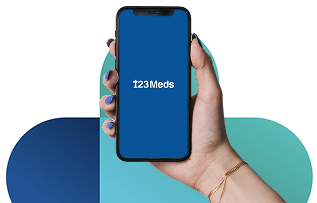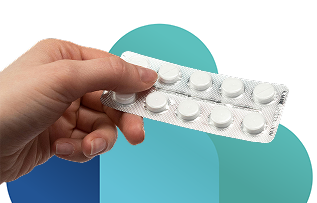Cystitis
Cystitis, or a urinary tract infection (UTI), can cause pain, burning, and frequent urination. While uncomfortable, prompt treatment can relieve symptoms quickly, prevent complications, and help you get back to your daily routine. Drinking plenty of water and practicing good hygiene can also help reduce the risk of recurrence.
Through 123Meds, you can receive expert-approved treatments for cystitis via our UK-registered online pharmacy service, with prescriptions reviewed by clinicians and delivered straight to your door.

pharmacists

consultations & orders

delivery before 3:30PM

Available Now
Cystitis

Cystitis is inflammation of the bladder, usually caused by a bacterial infection. It’s a common type of lower urinary tract infection (UTI), especially in women. In fact, around one in three women will experience cystitis by age 24.
Mild cases often clear up on their own within a few days, but some women have repeated episodes. If left untreated, cystitis can sometimes lead to more serious infections like a kidney infection, which requires urgent medical attention.
Cystitis is far more common in women, likely due to the shorter length of the urethra. Men with symptoms of cystitis should always see their GP, while mild cases in women may improve without antibiotics.
Cystitis is usually caused by a bacterial infection, most often E. coli, which is responsible for up to 95% of cases.
Bacteria enter the urinary tract through the urethra (the tube that carries urine out of the body) and travel to the bladder. The bladder is normally sterile, so the presence of bacteria triggers inflammation, causing the symptoms of cystitis.
Cystitis can also be caused by using a urinary catheter, as this increases the risk of bacteria entering the bladder.
Cystitis often causes a range of uncomfortable urinary symptoms. The most common signs include a burning, stinging, or painful sensation when passing urine, a frequent urge to urinate, and a feeling of fullness in the bladder even after emptying it. You may also experience discomfort or pain in the lower abdomen, along with strong-smelling urine.
In more severe cases, symptoms may suggest the infection has spread to the upper urinary tract or kidneys. These can include blood in the urine, pain in the side or lower back, a high temperature or feeling feverish, and in some cases, a very low temperature. UTIs can also cause drowsiness or confusion, especially in older adults.
If you experience any of these more serious symptoms, it’s important to contact your GP or NHS 111 immediately for further advice and treatment.
Mild cases of cystitis often clear up on their own without antibiotics, especially if symptoms have lasted less than two days. To relieve symptoms, you can take over-the-counter painkillers like paracetamol or ibuprofen to ease discomfort. It's also advised to avoid sex until you feel better, as it can make symptoms worse. Drinking plenty of water may help flush out the infection more quickly.
You can also try cystitis relief products available in our shop, such as Cystopurin, which help by reducing the acidity of your urine to ease symptoms.
Some people find cranberry juice helpful, but current evidence on its effectiveness is limited.
Antibiotics for UTIs
If your cystitis symptoms are severe or haven’t improved after 3 days, you may need antibiotics. In the UK, antibiotics for UTIs are usually prescribed for 3 days, but longer courses may be needed in some cases.
Your GP may request a urine sample to choose the most suitable treatment. The most commonly prescribed antibiotics for cystitis are Trimethoprim and Nitrofurantoin. For more severe infections, Fosfomycin or Pivmecillinam may be used.
Antibiotics are typically effective, with symptoms often improving within 1–2 days. However, it's important to complete the full course, even if you start to feel better. If symptoms don’t improve, contact your GP, as you may need a different treatment.
Preventing Cystitis
To help prevent cystitis, follow these simple tips:
- Drink plenty of fluids, ideally water
- Always wipe from front to back after using the toilet
- Urinate as soon as possible after sex
- Avoid perfumed soaps, bubble baths, and talcum powder in the genital area
These habits can reduce your risk of future infections.
Why do I keep on getting cystitis?
There can be a number of reasons why some people are more susceptible to recurrent bouts of cystitis (recurrent is defined as more than 2 episodes in 6 months or more than 3 in one year). If you have experienced multiple episodes of cystitis recently, we would advise that you seek further review from your GP to establish potential causes and receive appropriate preventative treatment.
Does my partner need treatment if I have cystitis?
Cystitis is not an STI, but it can occur in females as a result of bacteria transfer during sex - If your partner develops symptoms, they should seek a review from their GP.
What happens if cystitis is left untreated?
In many patients, self care is sufficient and symptoms resolve by themselves within 48 hours - In rare cases if untreated and if symptoms remain persistent cystitis can develop into a kidney infection. If you do develop symptoms such as fever, vomiting or pain on the sides of your stomach (flank pain), we would advise that you seek urgent review from your GP, NHS111 or A&E as appropriate as these symptoms are indicative of a more serious infection.
Can cystitis affect men?
Whilst men can develop cystitis, this is extremely rare - If you are a man and suffering from urinary symptoms, further investigations are required to confirm the diagnosis of urinary tract infection and to exclude any underlying causes.
Fill out a quick form!
Fast, safe online consultations – no need to visit a GP or pharmacy.

Select your medication
Once you’ve completed the assessment, we’ll show you treatments that are right for you.

Prescriber review
Our prescribers will review your consultation and, if it's right for you, send a prescription to our pharmacy.

Express Delivery
Discreet delivery straight to your door, as soon as the next day.

Our 5-Point Safety Guarantee
We focus on trust, privacy, and expert service in online medication ordering.
GPHC and MHRA Regulated Pharmacy
Regulated by all necessary UK regulatory bodies
UK qualified Pharmacists
All consultations reviewed by UK pharmacists
Authentic Medication
Sourced from approved suppliers only
Customer Care
Customer care team available via email or phone
Trusted by Thousands
Thousands of satisfied customers

pharmacists

consultations & orders

delivery before 3:30PM

Available Now

